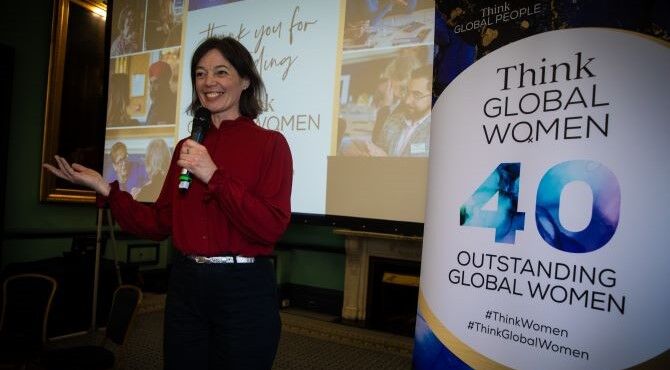Resolving the most difficult workplace conversations
Sarah Rozenthuler’s interactive session ‘Supercharged You: Leaning into difficult conversations’ was designed to help leaders and managers to amplify their voice and make meaningful change happen. As she explained, Leadership is not just about decision making, it is also about communication and having your voice heard.

This article is taken from the Spring 2025 issue of
Think Global People magazine
View your copy of the Spring 2025 issue of Think Global People magazine.The workshop was led by Sarah Rozenthuler, an accomplished author and founder of Bridgework Consulting, which empowers leaders, teams, and organisations to achieve greatness. Sarah is a member of the faculty at Saïd Business School, University of Oxford, where she teaches on the Advanced Management and Leadership Programme.Her latest book Now We’re Talking: How to discuss what really matters, explores how approaching difficult conversations with planning and preparation can be an opportunity for growth and transformation.In her workshop she challenged attendees to think about:
- What are you not discussing that you need to talk about?
- What do you always discuss but never resolve?
- How do we cut through patterns in organisations of avoiding or attempting conversations?
What gets in the way of good conversations?
Sarah also looked at some of the blockages and issues that might stop people having healthy conversations about difficult themes. These include:- I don’t have the time
- There are some people you can’t talk to
- Nothing will change anyway (ie I would rather not have that conversation)
- Better not rock the boat (expressing a fear of potential fallout from the conversation and even emotional damage)
Read related articles
- Encouraging the best in everyone in the workplace and supporting women and girls in fulfilling their potential
- Taking action to accelerate inclusion and gender equality in the workplace
- Celebrating the female superpower
- Think Global women: key issues affecting women’s employment
Name it to tame it – Name the block to loosen its grip on you
Sarah explained that barriers, both internal and external, can hinder your ability to engage. She discussed the psychological principle of “name it to tame it.” In other words, by naming your fears, they lose some of their grip on you. An example, which Sarah had used herself, was to be open and say: “I’m feeling really agitated by this conversation”.Whether it is a lack of confidence, fear of conflict, or time constraints, by naming the issue that holds you back, you can reduce the fear. Sarah also looked at resources you could use to help you succeed in initiating and managing a difficult conversation and explained that although we might not want to engage with tricky issues, managing the fallout in the long run takes more time than leaning in and sorting it out.This might include actually speaking your opening line out loud, after you have decided what approach you are going to use. It might also be practising a difficult conversation with a friend, or having a personal mantra to encourage yourself when you are nervous.She suggested you “Name it to claim it” in order to tap into the strength of past successes and your internal and external resources to provide support.“Think about what you can draw on to get you across the line,” she says. “Having a difficult conversation is a skill that you can learn and practice.”In a session packed with practical advice, her major takeaways for difficult conversations include taking your seat and being present and not distracted, finding your opening line and practicing it out loud, picking your moment and place, preparing for contingencies and having an affirmation that can take you over the threshold.Bio

2 Day programmeSarah Rozenthuler will be hosting a 2-day programme, ‘Creating Change through Dialogue for Global People‘ on 18 & 19 June in Lamberhurst, Kent. For more information, please email office@bridgeworkconsulting.com or call +44 (0)7971 977774 |



Find out more about the Think Global People and Think Women community and events.

Subscribe to Relocate Extra, our monthly newsletter, to get all the latest international assignments and global mobility news.Relocate’s new Global Mobility Toolkit provides free information, practical advice and support for HR, global mobility managers and global teams operating overseas.
©2025 Re:locate magazine, published by Profile Locations, Spray Hill, Hastings Road, Lamberhurst, Kent TN3 8JB. All rights reserved. This publication (or any part thereof) may not be reproduced in any form without the prior written permission of Profile Locations. Profile Locations accepts no liability for the accuracy of the contents or any opinions expressed herein.







































